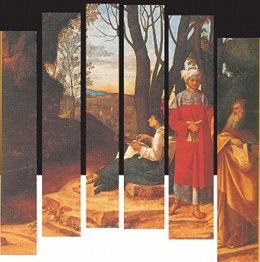Tag: Renaissance
Trial: Ebook collections from Librairie Droz
Until July 10th, the Library has access to three portals of ebooks published by Librairie Droz.
Textes Littéraires Français
Eugénie Droz founded the Textes Littéraires Français after the end of World War II, in 1945. This collection is dedicated to the critical edition of significant texts from the French literary heritage from the Middle Ages to the twentieth century. The texts are available in a small, handy format, and each edition is accompanied by an introduction, notes, a glossary, and an index when necessary. This rigorous critical apparatus welcomes the scholarship of the best specialists to shed light on the creation of these works, and, no matter their time period, to provide modern readers with the most meticulous explanations on their historical, cultural, and linguistic contexts. For seventy years, the collection has welcomed, in addition to some smaller works, more than 600 monuments of French literature.
Humanisme et Renaissance
Founded by Eugénie Droz in 1950, the collection Travaux d’Humanisme et Renaissance has brought together more than 550 titles in sixty-five years. It is the most important collection of sources and studies on Humanism (Politien, Ficin, Erasmus, Budé…), the French Reformation (Lefèvre d’Etaples, Calvin, Farel, Beza…), the Renaissance (literary and artistic, Hieronymus Bosch or Rabelais, Ronsard or Primaticcio), as well as the medicine, science, philosophy, book history, and all forms of knowledge and human activity from the long sixteenth century, roughly from 1450 to the death of Henry IV, the threshold of the classical age.
Calvin
This portal presents all the texts by or about John Calvin which have been published by the Librairie Droz from 1960 to 2012, with an initial focus on Geneva, Calvin, and the beginnings of the French evangelical movement with Lefèvre d’Etaples and Marguerite de Navarre.
There are tutorials available to help you take advantage of these resources:
- citations extraction and download : https://user.zord.tech/doku.php?id=fonctionnalites:citations
- zooming in images : https://user.zord.tech/doku.php?id=fonctionnalites:images
- Text editions, translations or images displayed opposite : https://user.zord.tech/doku.php?id=fonctionnalites:visavis
BiGLI Online
The Library has begun a subscription to BiGLI Online which is the digital version of the fundamental print bibliography and discovery tool for the field of Italian language and literature – Bibliografia Generale della Lingua e della Letteratura Italiana. It includes texts, critical and historical surveys, philogical and linguistic notes, essays, monographs, bibliographic reviews, and more from 1981 to present. With the assistance of an international team of experts and co-published by the Centro Pio Rajna and Salerno Editrice in Rome, the BiGLI is regarded as “a census of the diffusion and dissemination of Italian culture in the world.”
Resource: International Bibliography of Humanism and the Renaissance
The Library recently acquired from Brepolis the International Bibliography of Humanism and the Renaissance, a multi-disciplinary bibliography of the Renaissance and the early modern period (1500-1700) that includes entries for monographs, critical editions, translations, anthologies, miscellanies and exhibition catalogs, as well as specialized dictionaries and encyclopedias, handbooks, journal articles and reviews written in any language and presented in any format.
It reproduces online and continues the Bibliographie internationale de l’Humanisme et de la Renaissance, coordinated and published by Librairie Droz since 1965 (and located in our collection in the MAIN (Gardner) Stacks at CB361.1 .B52). The rights to the resource were acquired by Brepolis in 2013.
According to the site, the “core of the Bibliography focuses on European history and culture that spans the 16th and 17th centuries, and encompasses a broad spectrum of subjects, ranging from religious history through to philosophy, science and the arts; and from military and political history through to social and gender studies. Both the geographical and the chronological delimitations are not restrictive as the IBHR also includes publications on the European interactions with the wider world through exploration, colonisation, slavery and the Christian mission and extends its coverage to the modern period with the inclusion of modern hermeneutics, reception studies and the 21st c. teaching of texts written in the target period.”1
